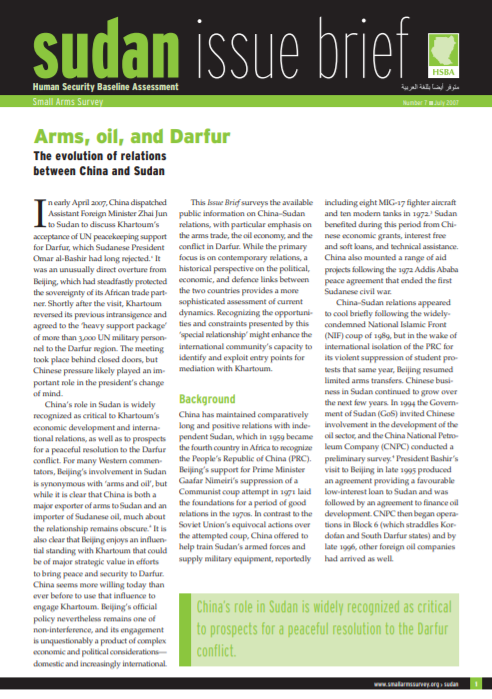
Arms, Oil, and Darfur: the Evolution of Relations between China and Sudan (HSBA Issue Brief 7)
In early April 2007, China dispatched Assistant Foreign Minister Zhai Jun to Sudan to discuss Khartoum’s acceptance of UN peacekeeping support for Darfur, which Sudanese President Omar al-Bashir had long rejected. It was an unusually direct overture from Beijing, which had steadfastly protected the sovereignty of its African trade partner. Shortly after the visit, Khartoum reversed its previous intransigence and agreed to the ‘heavy support package’ of more than 3,000 UN military personnel to the Darfur region. The meeting took place behind closed doors, but Chinese pressure likely played an important role in the president’s change of mind.
China’s role in Sudan is widely recognized as critical to Khartoum’s economic development and international relations, as well as to prospects for a peaceful resolution to the Darfur conflict. For many Western commentators, Beijing’s involvement in Sudan is synonymous with ‘arms and oil’, but while it is clear that China is both a major exporter of arms to Sudan and an importer of Sudanese oil, much about the relationship remains obscure. It is also clear that Beijing enjoys an influential standing with Khartoum that could be of major strategic value in efforts to bring peace and security to Darfur. China seems more willing today than ever before to use that influence to engage Khartoum. Beijing’s official policy nevertheless remains one of non-interference, and its engagement is unquestionably a product of complex economic and political considerations— domestic and increasingly international.
Arms, Oil, and Darfur: the Evolution of Relations between China and Sudan surveys the available public information on China–Sudan relations, with particular emphasis on the arms trade, the oil economy, and the conflict in Darfur. While the primary focus is on contemporary relations, a historical perspective on the political, economic, and defence links between the two countries provides a more sophisticated assessment of current dynamics. Recognizing the opportunities and constraints presented by this ‘special relationship’ might enhance the international community’s capacity to identify and exploit entry points for mediation with Khartoum.
Also available in ARABIC.
Have your say about Small Arms Survey publications and products: take 5 minutes to fill out our questionnaire.